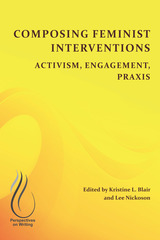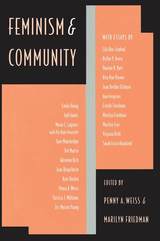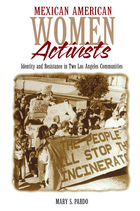4 books about Women in community organization

Composing Feminist Interventions
Activism, Engagement, Praxis
Kristine L. Blair
University Press of Colorado, 2018
This edited collection offers self-reflexive, critical accounts of how feminist writing studies scholars variously situated within rhetoric, composition, and literacy studies plan, implement, examine, and represent community-based inquiry and pedagogy. Readers will gain insight into the hows and whys involved with this important disciplinary work. Sharing a commitment to social change, the twenty-one chapter discussions and five course designs complicate and continue to evolve possibilities for how we conceptualize writing research and teaching as deeply collaborative, inclusive, and reciprocal practices.
[more]

Feminism and Community
edited by Penny A. Weiss and Marilyn Friedman
Temple University Press, 1995
"Construing 'community' extremely broadly, from personal friendship to global dreams, this imaginative collection reveals the diversity of women's experiences in both traditional and feminist communities."
--Alison M. Jaggar, Professor of Philosophy and Women's Studies, University of Colorado at Boulder
This rich collection of essays explores a range of feminist perspectives on the importance of community to women's social, cultural, and political relationships. From the personal to the ethnographic to the theoretical, these essays discuss such topics as the viability of lesbian separatism, women and the Holocaust, interracial solidarity among women, the flaws in nonfeminist communitarianism, and the revolutionary prospects of feminist communities.
[more]

A Jumble of Needs
Women’s Activism and Neoliberalism in the Colonias of the Southwest
Rebecca Dolhinow
University of Minnesota Press, 2010
Many immigrant communities along the U.S. border with Mexico are colonias, border settlements lacking infrastructure or safe housing. A Jumble of Needs examines the leadership of Mexican women immigrants in three colonias in New Mexico, documenting the role of NGOs in shaping women’s activism in these communities. Ethnographer Rebecca Dolhinow, who worked in the colonias, uncovers why such attempts to exercise political agency are so rarely successful.
Central to the relationship between NGOs and women activists in colonias, Dolhinow argues, is the looming presence of the neoliberal political project. In particular, the discourses of caretaking that NGOs use to recruit women into leadership positions simultaneously naturalize and depoliticize the activist work that these women do in their communities. Dolhinow discovers the connections between colonias as isolated communities and colonia leaders as political subjects who unintentionally reinforce neoliberal policy. In the long run, she finds, any politicization that might take place is limited to the women leaders and seldom involves the community as a whole.
Surprisingly, Dolhinow reveals, many NGOs promote neoliberal ideals, resulting in continued disenfranchisement, despite the women’s activism to better their lives, families, and communities.
[more]

Mexican American Women Activists
Mary Pardo
Temple University Press, 1998
When we see children playing in a supervised playground or hear about a school being renovated, we seldom wonder about who mobilized the community resources to rebuild the school or staff the park. Mexican American Women Activists tells the stories of Mexican American women from two Los Angeles neighborhoods and how they transformed the everyday problems they confronted into political concerns. By placing these women's experiences at the center of her discussion of grassroots political activism, Mary Pardo illuminates the gender, race, and class character of community networking. She shows how citizens help to shape their local environment by creating resources for churches, schools, and community services and generates new questions and answers about collective action and the transformation of social networks into political networks.
By focusing on women in two contiguous but very different communities -- the working-class, inner-city neighborhood of Boyle Heights in Eastside Los Angeles and the racially mixed middle-class suburb of Monterey Park -- Pardo is able to bring class as ell as gender and ethnic concerns to bear on her analysis in ways that shed light on the complexity of mobilizing for urban change.
Unlike many studies, the stories told here focus on women's strengths rather than on their problems. We follow the process by which these women empowered themselves by using their own definitions of social justice and their own convictions about the importance of traditional roles. Rather than becoming political participants in spite of their family responsibilities, women in both neighborhoods seem to have been more powerful because they had responsibilities, social networks, and daily routines separate from the men in their communities.
Pardo asserts that the decline of real wages and the growing income gap means that unforunately most women will no longer be able to focus their energies on unpaid community work. She reflects on the consequences of this change for women's political involvement, as well as on the politics of writing about women and politics.
By focusing on women in two contiguous but very different communities -- the working-class, inner-city neighborhood of Boyle Heights in Eastside Los Angeles and the racially mixed middle-class suburb of Monterey Park -- Pardo is able to bring class as ell as gender and ethnic concerns to bear on her analysis in ways that shed light on the complexity of mobilizing for urban change.
Unlike many studies, the stories told here focus on women's strengths rather than on their problems. We follow the process by which these women empowered themselves by using their own definitions of social justice and their own convictions about the importance of traditional roles. Rather than becoming political participants in spite of their family responsibilities, women in both neighborhoods seem to have been more powerful because they had responsibilities, social networks, and daily routines separate from the men in their communities.
Pardo asserts that the decline of real wages and the growing income gap means that unforunately most women will no longer be able to focus their energies on unpaid community work. She reflects on the consequences of this change for women's political involvement, as well as on the politics of writing about women and politics.
[more]
READERS
Browse our collection.
PUBLISHERS
See BiblioVault's publisher services.
STUDENT SERVICES
Files for college accessibility offices.
UChicago Accessibility Resources
home | accessibility | search | about | contact us
BiblioVault ® 2001 - 2024
The University of Chicago Press









